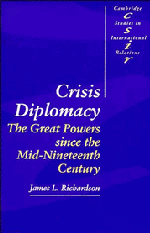Book contents
- Frontmatter
- Contents
- List of tables
- Acknowledgments
- I PART I
- PART II
- 4 The Eastern crisis, 1839–1841
- 5 The Crimean war crisis, 1853–1854
- 6 The Russo-Japanese crisis, 1903–1904
- 7 The Sudeten crisis, 1938
- 8 The Franco-Prussian and Agadir crises
- 9 Pearl Harbor and the Berlin crises
- PART III
- PART IV
- Notes
- Select bibliography
- Index
- CAMBRIDGE STUDIES IN INTERNATIONAL RELATIONS
8 - The Franco-Prussian and Agadir crises
Published online by Cambridge University Press: 03 May 2011
- Frontmatter
- Contents
- List of tables
- Acknowledgments
- I PART I
- PART II
- 4 The Eastern crisis, 1839–1841
- 5 The Crimean war crisis, 1853–1854
- 6 The Russo-Japanese crisis, 1903–1904
- 7 The Sudeten crisis, 1938
- 8 The Franco-Prussian and Agadir crises
- 9 Pearl Harbor and the Berlin crises
- PART III
- PART IV
- Notes
- Select bibliography
- Index
- CAMBRIDGE STUDIES IN INTERNATIONAL RELATIONS
Summary
Although the first of these crises led to war and the second did not, there were a number of similarities. The principal adversaries were the same, France and Prussia/Germany, the adversary relationship was of long standing and both parties were acutely sensitive to questions of prestige. Among the major differences were the systemic context, the significance of misperception and the willingness to risk war, but the last of these was related in complex ways not only to differing values among decision makers but also to the pressures of internal politics.
The Franco-Prussian crisis, July 1870
The Franco-Prussian is the only short crisis included in the study. It began when the candidacy of Prince Leopold of Hohenzollern for the Spanish throne became public knowledge in Paris on 3 July, and ended with France's declaration of war on Prussia on 15 July.
Compared with the other cases studied, the willingness to go to war was unusually high on both sides: each was highly sensitive to perceived threats to its prestige but quite prepared to engage in threatening behaviour. Bismarck was prepared to risk war in order to achieve his goals, provided the circumstances were favourable. France had resented Bismarck's brusque diplomacy after Prussia's victory over Austria in 1866, in particular his denial of French claims to compensation to balance Prussia's gains. There was a general perception that French primacy among the continental powers was being challenged by Prussia.
- Type
- Chapter
- Information
- Crisis DiplomacyThe Great Powers since the Mid-Nineteenth Century, pp. 161 - 180Publisher: Cambridge University PressPrint publication year: 1994

